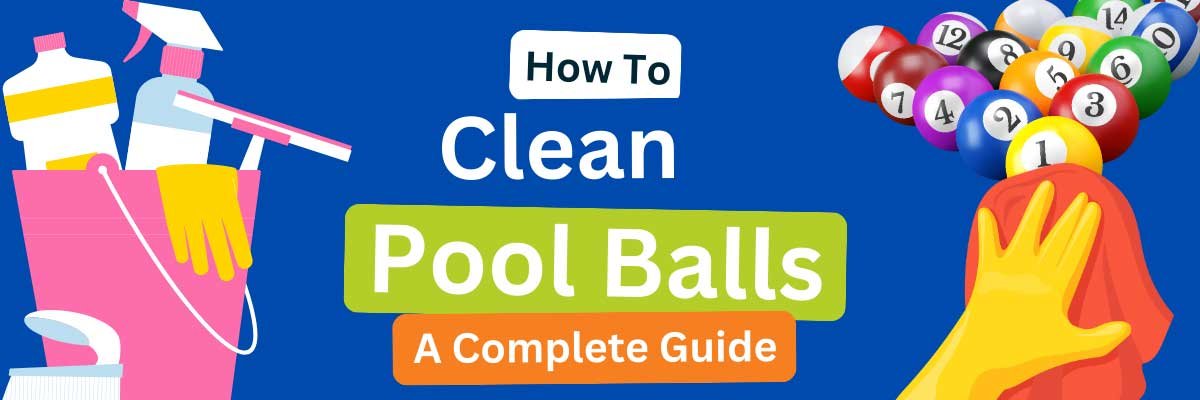How to Clean Pool Balls? A Guide to Cleaning Balls at Home

Maintaining the cleanliness and shine of pool balls is essential for both casual players and professionals.
It is also especially important if you think your pool balls may be worth something.
Rare antique balls, in great condition, can go for large sums, but they must be in good condition and satisfy a few other conditions.
Over time pool balls will wear out and can accumulate dirt, chalk, and other residues that affect their appearance and performance, however good maintenance will prolong their lifespan.
In this comprehensive guide, I will explore various methods and tips for effectively cleaning pool balls, ensuring they remain in top condition for every game.
Key Takeaways
- Regular Cleaning: Regular cleaning maintains the appearance and performance of pool balls.
- Appropriate Cleaning Agents: Use suitable cleaners to avoid damaging the ball’s surface.
- Manual vs. Machine Cleaning: Understand the pros and cons of each method.
- Maintenance Tips: Learn how to prolong the life of your pool balls.
How Do You Clean Your Pool Balls at Home?
To clean your billiard balls at home, one of the easiest ways I find is to handwash them with soap and warm water.
Soap and water work best if you have been keeping your pool balls regularly maintained and cleaned.
For particularly dirty billiard balls, you may want to use a ball cleaner polish or an electric ball cleaner.
You may even have an old pool ball set that may not be playable, but there’s no need to chuck them out. Old pool balls can be recycled in a number of ways to find use around the house.
Soap and Warm Water
To clean your pool balls at home using soap and warm water, you will need:
- A bowl/bucket
- Mild soap/detergent
- A microfiber cloth
- Lukewarm water
It’s important that you don’t use hot water, as this can damage the ball’s protective coating, and using cold water will do nothing to remove dirt and grime.
- Fill one bowl with warm water
- Add soap/detergent (Palmolive or Dawn work great)
- Mix into a soapy lather
- Place the balls into the bowl and leave to soak for 10 mins
- To avoid the balls knocking into each other, only place four balls at a time into the bowl
Soaking the balls in lukewarm water, makes it easier to remove the dirt and oily residues built up on the ball’s surface.
- After soaking, dampen the microfiber cloth and remove each pool ball individually, one at a time
- Wash the entire ball by buff in circular motions with the cloth
- Place the washed balls onto a clean dry towel
To avoid leaving spots, I don’t leave them out to air dry. I always use a soft towel to dry them after being washed and this never leaves any marks in them.
You can buff a little more vigorously with a sponge, or even a soft-bristled brush, if they have not come up completely clean.
Using a Pool Ball Cleaner
Alternatively, you can also a dedicated cleaner, like Aramith billiard ball cleaner, along with the Aramith restorer, as a way to clean and bring them back like brand new.
If you use the Restore, you will also need the cleaner, as the two work best together.
They are known as ball polishers, because they do exactly that, they restore shiny pool balls.
These are particularly good on old and dulled billiard balls, because handwashing with water and soap alone, can struggle to remove the dulled appearance on neglected balls, depending on how bad they are.
To Use a Ball Cleaner
- Use a clean microfiber cloth and wipe the balls
- Apply the cleaner to the ball – only a tiny pea sized small amount is needed
- Using another clean microfiber cloth, buff the cleaner around the entire billiard ball
- Stop buffering when you are happy it’s shining
- When the ball has fully dried, use another clean microfiber cloth, and wipe the whole ball again to remove the polisher film left on the surface
Polishing Dull Pool Balls
Using Wax
Another method is to wax your set of billiard balls with a car wax, like for instance turtle wax, which is very popular among some players.
You will need to clean them before using any wax on them, but the main benefit of waxing them is the aesthetically pleasing shine they leave.
However, if you want to wax your pool balls, there are drawbacks, like for instance;
- It can transfer to your pool table and ruin the playing cloth
- Goes against the WPBA standards
- Makes some shots virtually impossible
Using a Billiard Ball Machine
There is also the option of using a billiard ball cleaning machine, which does the same job of cleaning and polishing in less than half the time.
It is one of the easiest ways to clean billiard balls.
- Simply add the cleaner to the machine
- Load the amount of balls depending on the machine ball limit
- Run the cleaning cycle and remove the balls according to the instructions manual
- This should all take less than 10 – 15 mins
Why Do Pool Balls Turn Yellow?
Most balls today are made out of phenolic resin or are polyester-based balls, however the materials can change color as they age under exposure to different conditions.
When exposed to heat, oxygen and UV light:
- Phenolic resin balls turn a yellow stain
- Polyester-based resin balls, turn grey
If your pool balls look a yellow tint, then you have phenolic resin.
The thing to remember though, turning yellow is only the ball’s reaction to the conditions and only an aesthetic problem.
It doesn’t actually affect how they play, their roll, or have any impact on the playing cloth. However, it’s understandable when you clean your balls, you probably want the yellow gone as well.
How to Remove Yellow from Pool Balls?
Generally speaking, there are four different ways to get rid of the yellow using:
- Aramith Pool Ball Cleaning Machine
- Professional Pool Ball Cleaner
- Baking Soda
- Mr Clean Magic Eraser
Using Baking Soda to Remove the Yellow From Pool Balls
To get rid of the yellow using baking soda, follow these steps:
- Take a tablespoon of baking soda
- Add a little water, and mix the baking soda into a thick paste
- Use a microfiber cloth and rub the paste, in circular motion, into the yellow ball billiard ball
- Continue until you start to notice the yellow lifting and shinier ball
- Rise the paste off the ball with cold water
- Dry the ball with a clean microfiber towel
Using Mr Clean Magic Eraser
Using Mr Clean Magic Eraser couldn’t be easier.
All you need to do is rub the ball with the eraser until it is noticeably cleaner and the yellow removed. It is one of the most popular ways, along with the Aramith cleaner, to both clean and remove the yellow stains.
How to Stop Pool Balls Turning Yellow?
Properly storing your pool balls is the key to stopping them to turn yellow, and there’s no better way than using a travel carry case.
It is one of the best methods of storage, as it keeps them clean, and free of dust and dirt while they’re not being used.
It also protects them from exposure to UV light, heat and oxygen, which causes the color change to yellow.
Can You Clean Pool Balls in the Dishwasher?
No, you should never clean your pool balls in the dishwasher.
Regardless of whether your balls are made using phenolic, or polyester resin, they have low levels of heat resistance.
So if you’re thinking of placing your balls into the dishwasher, I would think again. Even on light settings, the heat of the water can be enough to:
- Destroy the protective layer that surrounds the surface of the ball
- Affect their durability and lessen their lifespan
- Cause dislocation and a dulled appearance
Can You Clean Pool Balls with Windex?
No, never use Windex to clean your pool balls.
The likes of Windex and other household cleaning products, like bleach, are abrasive. When they are used to clean the balls, the ball may be left with scratches and cause damage to the outer coating.
Benefits to Keeping Your Billiard Balls Clean
Maintains the Integrity of the Pool Table Felt
The thing is, when pool balls get dirty, it not only affects them, but also the integrity of the pool table’s felt.
Things like, skin cells and oil residues from all the constant handling residues, chalk, grime, dust and dirt all transfer easily to the cloth.
The cue ball especially picks up dirt, which is transferred to the other ball and cloth. This creates more friction between the two, which contributes to more wear and tear in the felt.
Better for the Longevity of the Balls
Keeping your billiard balls clean, is essential if you want to get the most out of them, because dirty balls will need to be replaced sooner rather than later.
The huge benefit here is the money it will save you in the long run, however, it is also much better in terms of performance.
After cleaning your pool balls properly, you should notice a better, smoother and faster roll, depending on the condition of the felt.





